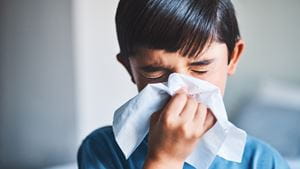
Every fall, viruses and other illnesses spread rapidly through school classrooms as children interact more frequently with one another. This year, however, there has been an earlier increase in the number of children coming to the emergency department at Rochester General Hospital for respiratory-related illnesses.
Colleen Markevicz, MD, is the Pediatric Emergency Department Medical Director with Rochester General Hospital, and Emil Lesho, DO, is an Infectious Disease specialist with Rochester Regional Health. They describe which illnesses are making the rounds in our community and precautions you can take to keep your family healthy.
While there are some students testing positive for COVID-19 in local school districts, Dr. Markevicz said the majority of cases bringing infants and children into hospitals are other viruses – particularly respiratory viruses.
Among the viruses being diagnosed and treated in the pediatric emergency department at Rochester General Hospital are:
“Children are testing negative for COVID, which is good, but they are still getting quite sick,” Dr. Markevicz said. “We are often prepared for infants and toddlers being brought in for respiratory illnesses, but this year seems to be more school-aged children who are being brought in for treatment.”
According to Dr. Markevicz, there is usually an increase in respiratory virus cases that typically starts in November and extends through March. This year, that increase is about one month ahead of what is expected.
While health care providers are treating more pediatric patients than usual for this time of year, the jump in viral cases is not entirely unexpected. Dr. Lesho points to health surveillance in the Southern Hemisphere that helps U.S. health care providers prepare for the winter flu season.
“Countries such as Australia and New Zealand saw an earlier and more severe flu season this year,” Dr. Lesho said. “The flu season in these countries often align with what the U.S. can expect for our own flu season and that appears to be the case for the 2022-2023 flu season.”
There are two main signs to look for with respiratory viruses that should lead parents to call their pediatrician and prepare to visit the emergency room.
If a child is breathing so quickly or working so hard to breathe that their breathing becomes abnormal, that can be a concerning sign. Since their little bodies are working harder to breathe, they may also not be eating or drinking as much. Consequently, a child may begin to show signs of dehydration, such as not being active, not urinating, or not taking eating or drinking anything for longer periods of time.
“If your child is displaying any of these symptoms, do not hesitate to bring them to your primary care provider or a pediatric emergency department sooner than later,” Dr. Markevicz said. “With some viruses like RSV, symptoms can become worse before they get better.”
One of the best ways to prevent these viruses from spreading is to keep sick children home from school. While it can be difficult to find childcare, keeping a sick child home is very better for everyone – even if a child tests negative for COVID.
“If a child is coughing and sneezing and has a fever, they should not be going to school because they are exposing other children to their illness,” Markevicz said. “Masks are no longer worn in schools and as a result, viruses are spreading like wildfire.”
When possible, wear a mask to protect your health and prevent spreading an illness if you are sick yourself. Staying physically distant when possible is also helpful in limiting the spread of these viruses.
Getting a flu shot and a COVID-19 booster shot are also key in staying healthy. An increase in COVID-19 cases is likely this winter, according to Dr. Lesho, due to lessened immunity from people’s initial COVID-19 vaccine series and first booster dose.
“The COVID-19 vaccines are not a silver bullet against ever becoming infected,” Dr. Lesho said. “We need to separate the idea of a positive COVID test from the idea of ending up in the hospital and the ICU. Vaccines are very effective against that.”